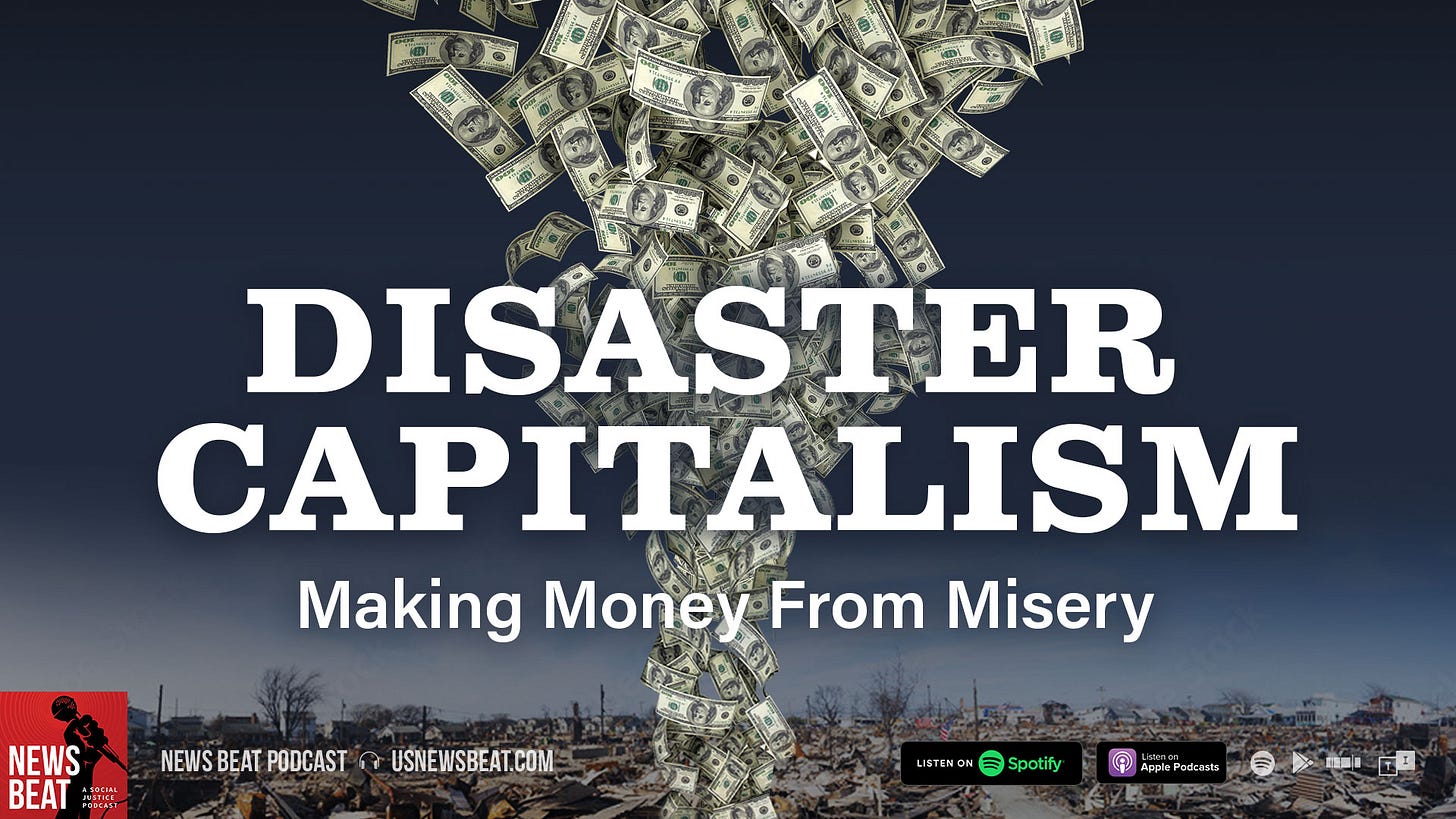Profiting From Misery
'Disaster capitalism,' a term coined by journalist Naomi Klein, is alive and well, as corporations and elites continue to make a killing off devastation and human suffering.
News Beat is a multi-award-winning podcast that melds hard-hitting journalism with hip-hop to inform, educate, and inspire. This episode is a follow-up to our powerful podcast about capitalism’s destruction of Afghanistan.
Well, we’ve made it, folks. This is our last podcast episode and newsletter of 2021. Before we break down the drop, we want to thank everyone for listening to News Beat podcast and reading our Substack. Just a reminder: They’re both free! So, if you haven’t already, please subscribe to the newsletter by sharing your email below. Also, please recommend News Beat to your friends and loved ones—we’re available on all podcast apps.
Stay safe, happy listening, and see you in the new year.
Many of our listeners might be familiar with renowned journalist and author Naomi Klein’s seminal 2007 book “The Shock Doctrine: The Rise of Disaster Capitalism,” in which she exposes how America’s so-called “free market” exploits disasters and their impacted populations for financial benefit.
Here’s what Klein wrote in a 2017 Guardian article:
The research showed that virtually any tumultuous situation, if framed with sufficient hysteria by political leaders, could serve this softening-up function. It could be an event as radical as a military coup, but the economic shock of a market or budget crisis would also do the trick. Amid hyperinflation or a banking collapse, for instance, the country’s governing elites were frequently able to sell a panicked population on the necessity for attacks on social protections, or enormous bailouts to prop up the financial private sector – because the alternative, they claimed, was outright economic apocalypse.
Klein’s analysis resonates today, as Sen. Joe Manchin of West Virginia, for example, a corporate Democrat, has torpedoed President Biden’s diluted social spending bill purportedly out of concern about modern-day inflation. Indeed, the “shock” Klein first wrote about more than a decade ago is alive and well.
So, coming off our episode about capitalism’s utter destruction of Afghanistan, we wanted to continue our examination of the harmful impacts of unfettered capitalism, especially in the developing world and within marginalized communities. Whether it’s war, economic devastation, or natural disasters, corporatists have successfully perfected the craft of turning chaos into opportunity.
Remember: “Chaos isn't a pit. Chaos is a ladder.”
Why We Covered This Topic
Well, for one, Australia-based investigative journalist Antony Loewenstein gave us no choice. To offer some background: We initially interviewed Loewenstein about the massive growth of the private defense industry during the post-9/11 wars, especially in Afghanistan and Iraq. As we discussed the impact these contractors—for example, Raytheon, Boeing, and General Dynamics—have had in the last 20 years, he went into great detail about disaster capitalism’s metamorphosis.
As Loewenstein explained in our interview, making money from misery is not a contemporary concept—but the sheer size and scope of such blood money-making schemes have grown dramatically, particularly after 9/11.
“The problem of what's happening in the last 20 years and how disaster capitalism is related to this is that it benefited a very, very few people at the expense of the many,” Loewenstein says in the episode.
Not only were we intrigued, but we wanted our listeners to hear more.
What You’ll Learn in This Episode
How the American withdrawal of Afghanistan may lead to further exploitation of the besieged, poverty-stricken, and decimated nation, via mining.
There’s reportedly upwards of $4 TRILLION (caps intentional) in untapped minerals in Afghanistan.
China, with its own mining operations in Afghanistan, has broadly welcomed the Taliban back to power, potentially adding to tensions with the United States.
Disaster capitalism goes far beyond battlefields and impacts people of all nations. For example, migrants fleeing war-torn, drought-stricken, or impoverished countries often end up detained in for-profit detention centers.
During natural disasters, such as the 2010 earthquake in Haiti, the for-profit aid industry reaped huge amounts of money.
Who We Interviewed & What They Said
Antony Loewenstein, independent journalist, author, and filmmaker. He wrote the book “Disaster Capitalism,” and co-created a documentary of the same name. Loewenstein is also the co-founder of the recently launched investigative news outlet Declassified Australia.
“Disaster capitalism really is a global ideology that has been turbocharged since 9/11…Earthquakes, disasters, floods, climate change, war is great for business, the more the better.”
“The Obama administration gave roughly $10 billion in supposedly support [to Haiti]. Much of that money disappeared, didn't go to the Haitian people, went to U.S. contractors who stayed in the U.S. It was a complete disaster. No one was ever held to account. And this, I think, is really what it comes down to on disaster capitalism: Virtually no one is ever held to account.”
Additional Resources
To learn more, check out Loewenstein’s book and documentary about “Disaster Capitalism.”
Of course, the inspiration for all this is Naomi Klein’s book “Shock Doctrine.” Pick up a copy at Bookshop.org.
For more on capitalistic destruction, listen to our podcast episode “Grifter’s Paradise: Capitalism’s Destruction of Afghanistan,” also featuring Loewenstein.
Join the News Beat Podcast Family!
Subscribe to our Substack to ensure you receive information about episodes, relevant stories, and more.
You can listen to News Beat on your favorite podcast app. The button below will enable you to subscribe wherever you listen to pods.
Please share our Substack to help build this community and support independent media.
News Beat is a multi-award-winning podcast brought to you by Morey Creative Studios and Manny Faces Media.
Audio Editor/Sound Designer/Producer/Host: Manny Faces
Editor-In-Chief/Producer: Christopher Twarowski
Managing Editor/Producer: Rashed Mian
Episode Art: Jeff Main
Executive Producer: Jed Morey


